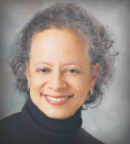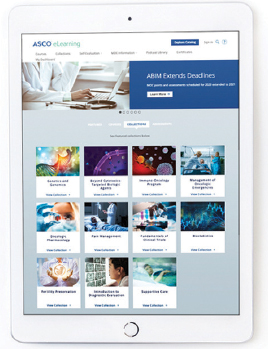“Equity: Every Patient. Every Day. Everywhere” was selected by 2020–2021 ASCO President Lori J. Pierce, MD, FASTRO, FASCO, as the theme for her presidential term. As oncology care providers work to put this theme into practice, they can find support in ASCO eLearning’s new Cultural Literacy course collection.
This course collection is designed to help multidisciplinary oncology team members increase their knowledge and practice of cultural competence. Through presentation of case-based scenarios that involve patients from diverse backgrounds, learners explore the societal and personal barriers that may limit cultural competence and hinder the delivery of high-quality care. The courses share communication strategies to help minimize and address cultural issues in the oncology workplace.

Lori J. Pierce, MD, FASTRO, FASCO
“Improving the cultural literacy of the entire oncology workforce is a pressing priority due to the increasing diversity of the U.S. population,” said Enrique Soto Pérez de Celis, MD, MSc. Dr. Soto is one of the planners for the overall collection and served as faculty for the “Patient-Centered Cancer Care for Older Adults” course.
“These courses will help the learners obtain new skills to provide care for patients from diverse backgrounds and provide them with the tools to improve patient engagement and to tackle systemic and personal barriers to providing high-quality cancer care,” he said.
Upon completing the collection, learners will be able to:
- Describe the concept of cultural competence and how it enhances the patient experience
- Demonstrate appropriate communication strategies to minimize and address cultural issues that may impact care
- Identify barriers within health care related to various aspects of cultural competency, specifically race, gender, religion, age, language, and culture
- Apply knowledge of personal barriers to improve the care of diverse patient populations.
There is a need for knowledge about cultural competence generally and specifically to improve care for patient populations that historically experience access barriers and worse outcomes in the health system. For example, “Transgender people with cancer have reported barriers to high-quality cancer care,” said Jennifer J. Griggs, MD, MPH, FASCO, faculty for the “Cancer Care for Transgender and Gender-Diverse Populations” course. She cited a study by Schabath et al published in the Journal of Clinical Oncology in 2019,1 which found that only 20% of oncologists reported feeling confident in their knowledge of health for transgender patients, and that 70% reported wanting to learn more about health for LGBTQ patients.
“We collaborated with transgender people who have had cancer to create an ASCO eLearning cultural literacy module that provides strategies for talking to patients, sharing decision-making, creating inclusive patient-completed intake forms, and structuring outpatient care settings to be inclusive of people of all genders,” said Dr. Griggs.

The collection includes five courses:
Cultural Humility discusses the impact of a patient’s culture and values on their view of illness and health in the context of making health-care decisions. Learners are encouraged to self-reflect on their encounters with patients and opportunities to improve communication and patient experience overall.
Access to Cancer Care reviews cancer care access barriers, including residential status, financial issues, social influences, and literacy, as well as the role of the oncologist’s cultural competence and culturally sensitive communication in addressing access barriers and reducing disparities in outcomes.
Patient-Centered Cancer Care for Older Adults focuses on avoiding ageism (discrimination based on a person’s chronologic age) when caring for older adults with cancer; this may involve including older patients in clinical trials, conducting geriatric assessments, and evaluating a patient’s decision-making capacity. The course also discusses the importance of considering treatment preferences and outcome priorities when planning cancer treatment for older adults.
Cancer Care for Transgender and Gender-Diverse Populations reviews best practices for communicating with and caring for transgender, cisgender, nonbinary, intersex, and gender-diverse people with cancer. Strategies for avoiding exclusion and addressing discrimination are outlined.
Cancer Care for Sexual Minority Populations reviews assumptions and biases against sexual minorities (LGBTQ+ individuals) in health care, as well as the discrimination and disparities in access to care these populations face. Strategies for practicing culturally sensitive communication and ensuring confidentiality are discussed.
Visit elearning.asco.org to access the Cultural Literacy Course Collection.
© 2020. American Society of Clinical Oncology. All rights reserved.
Reference
1. Schabath MB, Blackburn CA, Sutter ME, et al: National survey of oncologists at National Cancer Institute–designated comprehensive cancer centers: Attitudes, knowledge, and practice behaviors about LGBTQ patients with cancer. J Clin Oncol 7:547-588, 2019.

